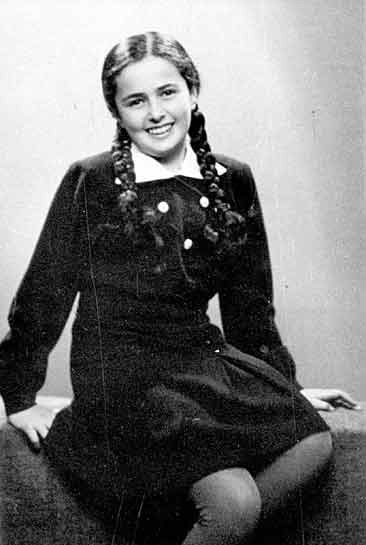Your cart is currently empty!
Dear diary, I don’t want to die

Wikimedia
Éva Heyman spent much of her brief life in the company of her grandparents following the divorce of her parents when she was a young child. On her thirteenth birthday, in February of 1944, as her home country of Hungary was taken over by the Nazis, she began a diary that would last just three months, its final entry—reprinted here—written days before she and her grandparents were transported to Auschwitz, their lives cruelly taken five months later. Amid the chaos of impending deportation, Éva entrusted her diary to Mariska, her family’s maid, who later delivered it to Éva’s mother, Agnes. Consumed by grief, Agnes tragically ended her own life in 1949.
The Diary Entry
May 30, 1944
The people of Block One were taken away yesterday. All of them had to be in their houses in the afternoon. We’ve been locked up in here a long time, but now even those with special passes aren’t allowed to go out anymore. We even know already that we can take along one knapsack for every two persons. It is forbidden to put in it more than one change of underwear; no bedding. Rumor has it that food is allowed, but who has any food left? The gendarmes took everybody’s food away when they took ours. It is so quiet you can hear a fly buzz. Nobody cries. We don’t even care that only Grandpa and Uncle Béla are allowed to take a knapsack.
Dear diary, everybody says we’re going to stay in Hungary; the Jews from all over the country are being brought to the Lake Balaton area and we are going to work there. But I don’t believe it. That train-wagon is probably awful, and now nobody says that we’re being taken away, but that they deport us. I’ve never heard this word before, and now Ági says to Uncle Béla: Béluska, don’t you understand? We are being deported!
There’s a gendarme pacing back and forth in front of the house. Yesterday he was in Rédey Park, from where the Jews are being deported. Not from the real railroad station, because then it would all be seen by the city, Grandpa says. As though the city cares at all. If the Aryans had wanted to, they could have prevented our being put in the Ghetto. But they were even glad about it, and now they also don’t care what happens to us!
That gendarme in front of the house, whom Uncle Béla calls a friendly gendarme, because he never yells at us and doesn’t even speak familiarly to the women, came into the garden and told us that he will have to leave the gendarmerie, because what he saw in Rédey Park isn’t a fit sight for human beings. They stuffed eighty people into each wagon and all they gave them was one pail of water for that many people. But what is even more awful is that they bolt the wagons. In this terrible heat we will suffocate in there! The gendarme says that he doesn’t understand these Jews: not even the children cried; all of them were like zombies; like robots. They walked into the wagon so mechanically, without making a sound. The friendly gendarme didn’t sleep all night, even though—he said—he usually falls asleep as soon as his head touches the pillow. It was such an awful sight that even he couldn’t fall asleep, he said. And after all, he’s a gendarme! Ági and Uncle Béla are whispering something to each other about our staying here in some kind of typhoid hospital, because they plan to say that Uncle Béla has typhoid fever. It’s possible, because he had it when he was in the Ukraine. All I know is that I don’t believe anything anymore, all I think about is Márta [her best friend, murdered by the Nazis], and I’m afraid that what happened to her is going to happen to us, too. It’s no use that everybody says that we’re not going to Poland but to Balaton. Even though, dear diary, I don’t want to die; I want to live even if it means that I’ll be the only person here allowed to stay. I would wait for the end of the war in some cellar, or on the roof, or in some secret cranny. I would even let the cross-eyed gendarme, the one who took our flour away from us, kiss me, just as long as they didn’t kill me, only that they should let me live.
Now I see that friendly gendarme has let Mariska come in. I can’t write anymore, dear diary, the tears run from my eyes, I’m hurrying over to Mariska…
Further Reading
Éva Heyman’s diary was translated into English by Moshe N. Kohn in 1974 and published by Yad Vashem. Fourteen years later it was reissued by Shapolsky Publishers, and copies of that edition can be found online.
It’s worth noting that some people think this diary was actually written by Éva’s mother while she grieved her daughter’s death, but I am in no way qualified to speculate on the matter. Nor would I want to.
Éva Heyman at the US Holocaust Memorial Museum.
Make a Donation
If you’re able, please consider supporting Diaries of Note with a donation.

Leave a Reply